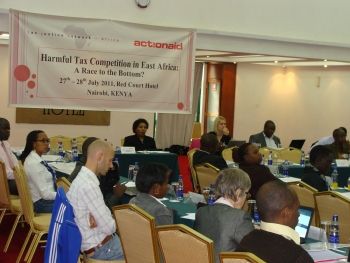
Publisher:
Bonnie King
CONTACT:
Newsroom@Salem-news.com
Advertising:
Adsales@Salem-news.com

~Truth~
~Justice~
~Peace~
TJP
Jul-28-2011 01:11

 TweetFollow @OregonNews
TweetFollow @OregonNews
Are Tax Incentives Propelling Africa to Self-Sustainable Economic Growth?
By Soren Ambrose for Salem-News.comAs one high-ranking tax official from an East African country put it, “these businesses all say ‘I’ll take your money if you’re foolish enough to give it away.’”
 Photo: ActionAid |
(NAIROBI, Kenya) - A joint ActionAid and Tax Justice Network-Africa conference on “harmful tax competition in East Africa” got underway Wednesday morning in Nairobi-Kenya, bringing together policy makers and civil society organization from the region.
The material may sound dry, but the reality behind it isn’t. And after attending a fair number of conferences over the years, I’d have to say that the discussions at this one were among the most animated I’ve heard.
African governments have a bad habit of offering big incentives – particularly “tax holidays,” typically for 10 years, in order to persuade foreign companies to invest in their countries. This despite several years of studies demonstrating that companies choose where to locate based on three main factors: stability of the political and economic environment, potential markets, and location and in the case of extractives, availability of the oil, or gold, or uranium, or whatever. That means resources that could be addressing gaps in education, health care, infrastructure, or – as we most regret in times of emergency like these – drought and hunger preparedness, are going uncollected and unused.
As one high-ranking tax official from an East African country put it, “these businesses all say ‘I’ll take your money if you’re foolish enough to give it away.’” But it’s not what motivates them to go to one country or another.
While several participants said that there are situations where limited tax incentives make sense, there were no defenders of the status quo. And this is a meeting that includes representatives of manufacturers’ associations, accounting firms, and international financial institutions. Indeed, one accounting firm representative said “if the loophole is there, I will have to use it for my clients” even though he thinks the authorities are making big mistakes.
And the first presentation of the day came from the head of the Kenyan office of the International Monetary Fund (IMF) -- an organization that ActionAid has long criticized for its restrictive austerity programs. The IMF, it turns out, has been advising against tax incentives since the 1990s, and in recent years has raised its voice on the issue more often. An IMF conference in Nairobi in April challenged regional countries to eliminate the incentives, and officials like the Kenyan finance minister said they would start to do so. It hasn’t happened yet, but if civil society groups and the IMF make common cause – for probably the very first time – perhaps we can capture attention and make it happen.
The highlight of the day, I think, was the presentation and discussion of a paper on tax incentives in Rwanda. Of the five countries of the East African Community (the other four being Uganda, Burundi, Tanzania, and Kenya), Rwanda’s incentives represent by far the highest percentage of the total tax collection – about 35%. People from Rwandan civil society and thinktanks had an opportunity to trade ideas with a representative of the Rwandan Revenue Authority, as well as other national revenue authorities. By the end of the day, there was talk of a follow-up conference in Kigali, as the Rwandans discovered mutual openness to reviewing the current system and making changes.
On Thursday we’ll take the discussion to the regional level: how can the East African Community help coordinate efforts to keep the countries from competing with each other and creating a senseless “race to the bottom” in the rush for foreign investors?
While in Nigeria, Ambrose met with many Nigerian authors and academics, and learned that a professor's monthly salary was less than the price of a paperback novel. Many of those he met with consequently were more interested in discussing the country's economic state than its literary scene. They were nearly unanimous in identifying the structural adjustment programs imposed on Nigeria by the International Monetary Fund (IMF) and World Bank as the root cause of the country's (and Africa's) poverty.
Articles for July 27, 2011 | Articles for July 28, 2011 | Articles for July 29, 2011






Terms of Service | Privacy Policy
All comments and messages are approved by people and self promotional links or unacceptable comments are denied.
[Return to Top]
©2026 Salem-News.com. All opinions expressed in this article are those of the author and do not necessarily reflect those of Salem-News.com.